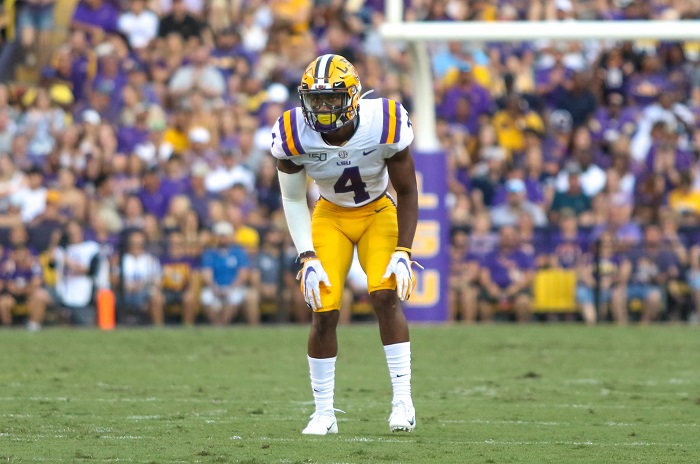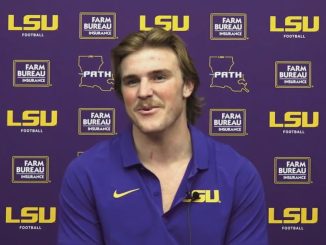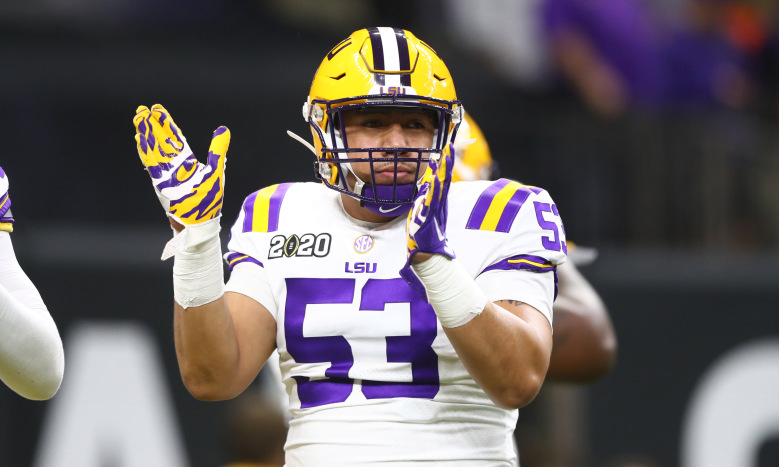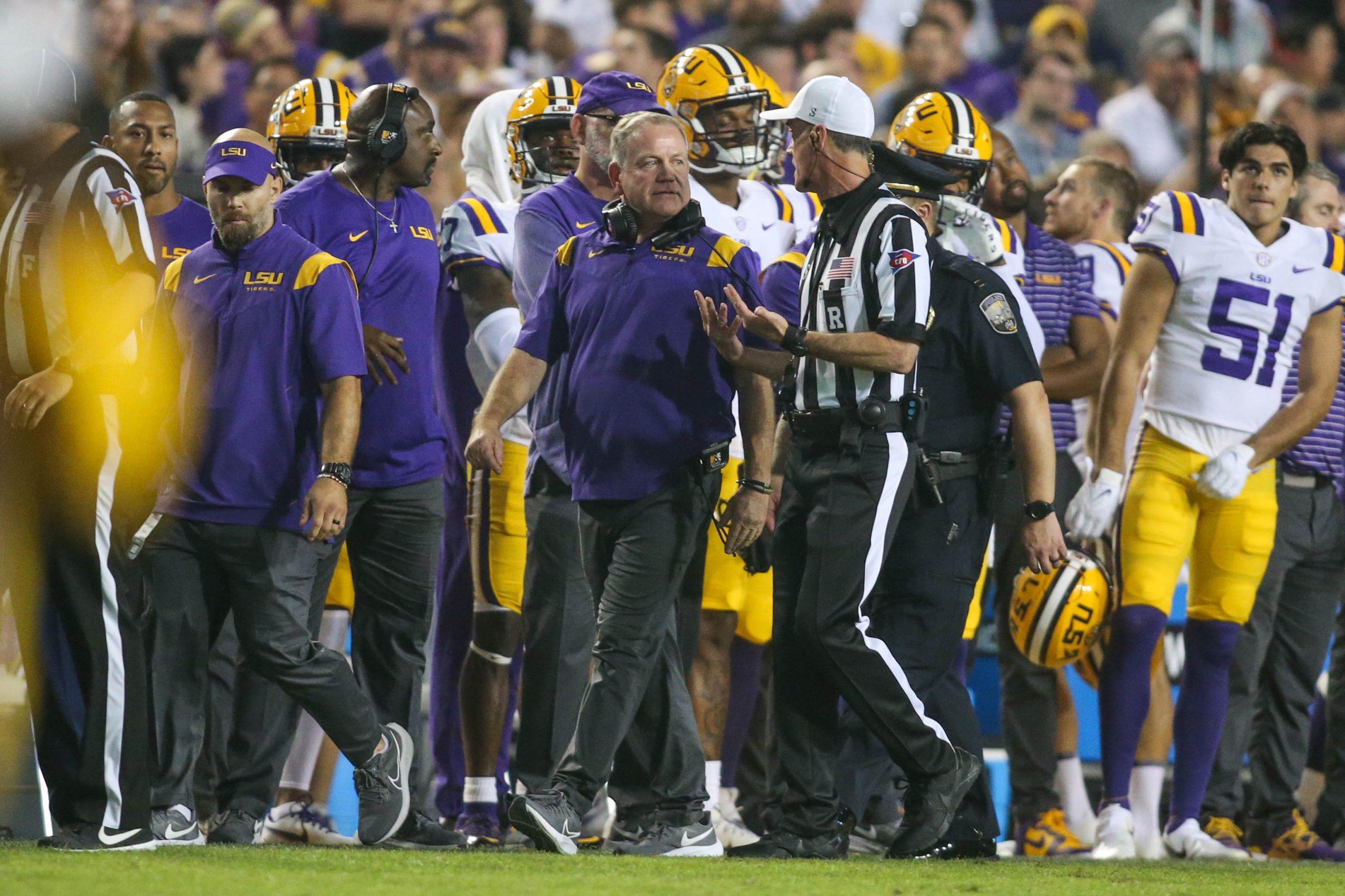
LSU safety Todd Harris Jr. was four months removed from season-ending knee surgery when he arrived with his teammates Jan. 13 for the College Football Playoff national championship game in the Mercedes-Benz Superdome.
Despite his own personal setback – a torn ACL in his right knee in the third game of the season against Northwestern State – Harris remained engaged throughout in LSU’s magical 15-0 run. The first-year starter at safety was on the sideline for all of his team’s home games and the season’s two biggest road games, a 63-28 national playoff semifinal win over Oklahoma in Atlanta followed by a trip home two weeks later to Louisiana for a 42-25 national title triumph over Clemson.
“Never for a second did I think I wasn’t a part of that, and I never will,” said Harris, who was allowed to redshirt after not playing in more than four games in 2019 and who will be a junior this upcoming season. “I believe I’m a national champion. I enjoyed the season. I’m part of one of LSU’s greatest teams to ever come through. Even though I wasn’t physically a part of it I was still a part of it. I know how much work I’ve put in over these couple of years, so it’s not like I don’t include myself.”
The greatest season in LSU history didn’t encounter its first bout of adversity until game three in the Tigers’ 65-14 victory over Northwestern State.
A year after recording 31 tackles with three pass breakups and an interception in 11 games, Harris was regarded among the Tigers’ top returning defensive backs when he went airborne to knock away a pass in the second quarter of his team’s Sept. 14 non-conference game.
For someone who was able to avoid major injuries during a star-studded career at Plaquemine High School, Harris didn’t belabor the point when he crashed to the Tiger Stadium turf in unmistakable pain.
“I came down, landed wrong and felt a pop,” Harris said. “I went back and watched the play a thousand times. I don’t think there was anything I could have done to prevent the injury. It happened so fast, I had pain for a couple of minutes. I couldn’t walk off the field.
“When I got home, I was up walking around with a brace on it. I suspected it was a serious injury. Then I got the call that Sunday and found out the results. It was meant to be. It was all God’s work. He knows it’s going to have a bigger meaning in the end.”
LSU safeties coach Bill Busch, a veteran of 20 seasons, didn’t initially see the play involving Harris but the replay left him sick to his stomach.
“You want to talk about a gut-wrenching play,” Busch said during a recent interview on the Baton Rouge sports radio talk show ‘Off The Bench’. “They showed the replay, so I could see it very clearly. It was devastating. It was devastating to me. It probably took a series for me to get my head back around it.”
Busch believed Harris, who played the safety position opposite eventual Jim Thorpe winner Grant Delpit, was in store for a breakthrough season in a 27-game career highlighted by a pass breakup resulting in JaCoby Stevens’ interception with 20 seconds left to cap LSU’s 40-32 win over Central Florida in the 2019 Fiesta Bowl.
“He was doing so many great things and playing so much,” Busch said. “He was going to be someone that would have played 500-600 snaps during the season and to lose him was rough.”
Harris took the necessary steps during the pre-surgery phase of his process, starting with the strengthening of his quadriceps muscle with the actual surgery following weeks later.
The recovery phase took on a more mental approach in the infancy stages with Harris envisioning a broader picture, getting back to place he eventually wanted which was the playing field.
“The more things you start to do is when you gain your confidence,” he said. “You see yourself standing up and doing different things. It’s just progress. You don’t see the progress until months later. But when you see it, you realize that you’ve come a long way.
“At the end of the day I have goals and aspirations. I’ve got to be mentally strong to pursue those goals. Of course, I had bad days. The goal is to have more good days than bad days. Even when I wasn’t motivated, I just thought about the end result. I had to shift gears in my head and erase that self-doubt and grind.”
Never was the close-knit fabric surrounding LSU’s program more evident than during Harris’ rehabilitation process, one that initially included the guidance of LSU’s medical staff, but regularly relied on the support of his coaches and teammates.
“I had a lot of people around me keeping me constantly motivated and that helped me get through it,” Harris said. “Just keeping me up, keeping my spirits high. They know the type of person that I am. I have high spirits and I’m self-motivated. The goal is to get my knee as best as I can and constantly build on it.”
Nearly two months after LSU tasted victory in New Orleans and Harris marveled at the purple and gold confetti that fell around him, the 5-foot-11, 190-pounder – seven months after surgery – was ready for limited action when the Tigers began spring training.
“I did some individual drills without contact,” Harris said. “I did some (individual) drills. I broke on the ball, nothing too crazy. I was there more for the mental part of the game, learning a new (4-3) defense. The big thing was to visualize it, learning that defense from the sideline.”
LSU’s spring football consisted of three practices before the Southeastern Conference halted all activities by league members in mid-March because of a growing coronavirus pandemic.
The COVID-19 health scare resulted a shutdown of LSU’s campus, forcing Harris for the most part to continue rehabbing his knee on his own while finishing the spring semester by taking online classes.
“I was definitely making progress before the virus came along,” Harris said. “I just have to pray and keep working. There are things you can’t control in life. Whenever it’s time to play ball again, I want to be prepared both physically and mentally. I want to be in tip-top shape, have 100% confidence in my knee and just play ball. I’m just anxious to play.”
Busch looks forward Harris’ return to an LSU secondary which has the prospect of being one of the team’s strengths.
“If Todd’s not the hardest worker on the team, he’s tied for it,” Busch said. “He’s probably the most likeable and loved player on the LSU team. There wouldn’t be no one more than him. When you walk into your (meeting) room and Todd Harris is in your room, good things are going to happen.”




Be the first to comment